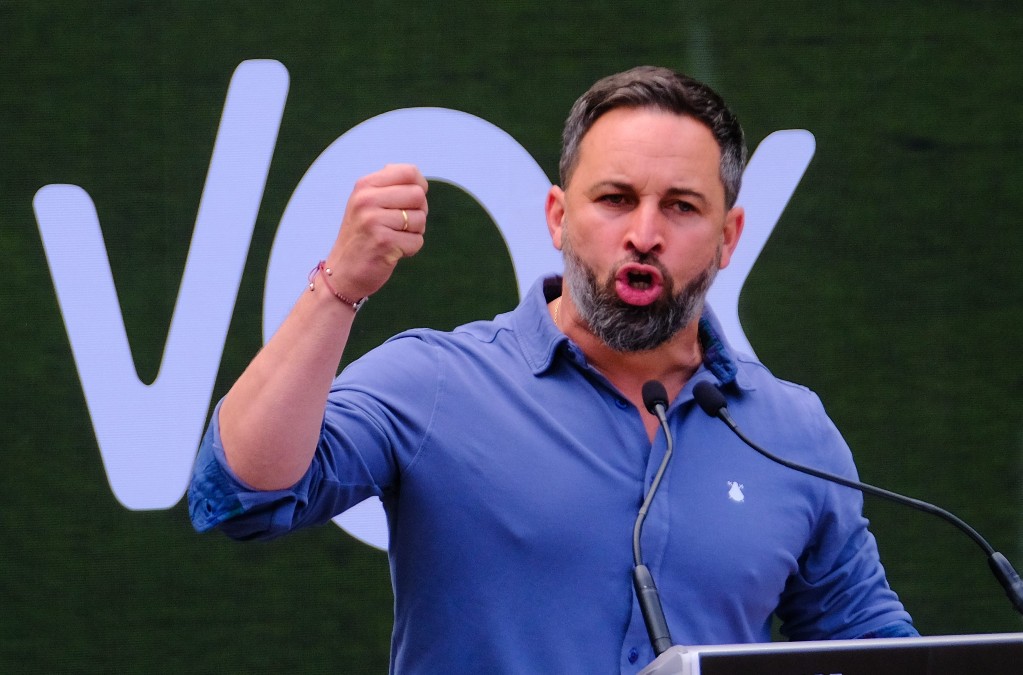AS THE JULY 23 general election approaches, tensions are rising on the campaign trail, with the conservative Popular Party and far-right Vox, who are expected to form a coalition government, increasingly mired in controversies.
The general secretary of Vox, Ignacio Garriga, was involved in a scuffle on Sunday with protestors in Badalona.
At a campaign rally, Garriga suddenly broke off from the speech he was making to go and confront a group of protestors who were waving senyera flags, which represents the Catalan independence drive, as well as LGBTQ+ rainbow flags. Vox is completely opposed to an independent Catalonia and also wants major changes to laws covering gay rights.
The confrontation involved the police who were present, Garriga’s bodyguards and Vox supporters, with the scene descending into a chaos of shouting and recrimination.
The leader of Vox, Santiago Abascal, predicted that the serious tensions that were experienced in Catalonia in 2017, when the illegal referendum on independence was held, were likely to return should his party enter into a coalition with the conservative Popular Party (PP), as the polls are predicting.
“There will not be any dithering with us,” he said, in allusion to the hard line that his party has always taken toward supporters of Catalan independence.
Asked by reporters if tensions would return should the PP and Vox be governing Spain, he replied: “I have no doubt about it.”
Meanwhile, the leader of the Popular Party, Alberto Nuñez Feijoo, waded into a row over pensions on Monday during an interview with state broadcaster TVE.
Moments of tension
Speaking to journalist Silvia Intxaurrondo, who has a reputation for asking tough questions and being well prepared for interviews, Feijoo insisted that his party had always raised pensions in line with the inflation rate.
Intxaurrondo, however, repeatedly pointed out that this was not true, causing uncomfortable moments of tension during the live broadcast.
“I don’t know where you’re getting your information,” an increasingly testy Feijoo said to the journalist when presented with her data. “As there is an archive, you can go and check what I’m saying. And I’m telling you know, if I’m wrong, I will apologise, and if you are, I hope that you will make that clear on this program.”
In the end, Feijoo had to admit on Tuesday that he had indeed misspoken, and that he meant to say that the PP had always raised pensions, but not always in line with the inflation rate.
Postal votes
Also on Tuesday, Feijóo slammed the leadership team at Spain’s state Correos postal service for being ‘very mediocre’ and for a lack of planning ahead of the July 23 elections.
The polls mark the first time in decades that Spaniards have been called to vote in the summer months, meaning that many people will be taking their vacation when the polling booths are open. Postal votes will be key to the elections, but the PP candidate has been insisting during the campaign that they are not being properly handled.
The surprise general elections were called by Socialist Party Prime Minister Pedro Sanchez after the left’s poor showing at the May 28 local and regional polls.
Surveys have consistently predicted that the PP will win most votes but fall short of a majority, with a Vox coalition the only likely way that Feijoo could take power.
The Socialist Party, meanwhile, could still cling onto power via a coalition with new leftist alliance Sumar, but would likely need support from other smaller parties to do so.
Read more:
- Record figures as Spain’s Correos mail service delivers over 2.6 million postal votes
- Police in Madrid arrest five men after they attacked a stand for far-right Vox
- Popular Party leader comes out on top during bad-tempered election debate with prime minister
Click here to read more Politics News from The Olive Press.








